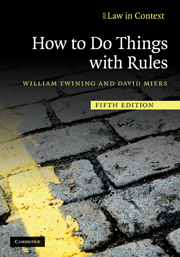Book contents
- Frontmatter
- Contents
- Preface
- Online appendices
- Acknowledgements
- Abbreviations
- Table of statutes and legislative instruments
- Table of cases
- Part I
- Part II Reading, using and interpreting rules in general
- 2 Problems and mischiefs
- 3 Of rules in general
- 4 Interpretation and application
- 5 Imperfect rules
- Part III Reading law: reading, using and interpreting legislation and cases
- Part IV
- Index
- Resources on the web
- References
2 - Problems and mischiefs
Published online by Cambridge University Press: 05 June 2012
- Frontmatter
- Contents
- Preface
- Online appendices
- Acknowledgements
- Abbreviations
- Table of statutes and legislative instruments
- Table of cases
- Part I
- Part II Reading, using and interpreting rules in general
- 2 Problems and mischiefs
- 3 Of rules in general
- 4 Interpretation and application
- 5 Imperfect rules
- Part III Reading law: reading, using and interpreting legislation and cases
- Part IV
- Index
- Resources on the web
- References
Summary
In law-and-society theory, the phrase ‘law in context’ points to the many ways legal norms and institutions are conditioned by culture and social organization. We see how legal rules and concepts, such as those affecting property, contract, and conceptions of justice, are animated and transformed by intellectual history; how much authority and self-confidence of legal institutions depends on underlying realities of class and power; how legal rules fit into broader contexts of custom and morality. In short, we see law in and of society, adapting its contours, giving direction to change. We learn that legal order is far less autonomous, far less self-regulating and self-sufficient, than is often portrayed by its leaders and apologists. This perspective encourages us to accept blurred boundaries between law and morality, law and tradition, law and economics, law and politics, law and culture. Accepting the reality of blurred boundaries leads to much puzzlement and controversy. Law loses some of its special dignity and some jurisprudential questions cannot be avoided.
In recent years academic law has been dominated by friendly rivalry between two main types of approach. The more traditional one, sometimes known as the ‘black letter’ or ‘expository’ approach, treats the systematic exposition and analysis of legal rules (‘doctrine’) both as the starting point and the almost exclusive focus of the study of law. In this view, sociological, historical, critical and other perspectives are at best ancillary and should only be introduced after the student has gained an extensive basic knowledge of the law-as-it-is.
Information
- Type
- Chapter
- Information
- How to Do Things with Rules , pp. 69 - 79Publisher: Cambridge University PressPrint publication year: 2010
